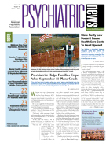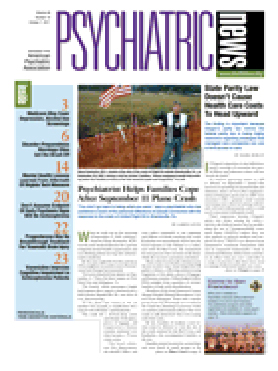Three antipsychotic drugs—risperidone, olanzapine, and haloperidol—were significantly more effective than mood stabilizers and other antipsychotics in treating manic episodes, according to a new meta-analysis.
In addition, the analysis showed that haloperidol had the highest number of significant differences in mania-treatment studies. Haloperidol was significantly more effective than lithium, quetiapine, aripiprazole, carbamazepine, asenapine, valproate, ziprasidone, lamotrigine, topiramate, and gabapentin (see
Which Are Best for Active Mania?).
The study also found that lithium, aripiprizole, quetiapine, carbemazepine, asenapine, valproate, and ziprasidone were significantly more effective than placebo, whereas gabapentin, lamotrigine, and topiramate were not. The study was published online in the Lancet on August 17.
Andrea Cipriani, Ph.D., a lecturer in psychiatry at the University of Verona, Italy, and colleagues reviewed 68 randomized controlled trials, which included 16,073 participants, from January 1, 1980, to November 25, 2010, in which any of the following medications at therapeutic dose ranges were studied for the treatment of acute mania in adults: aripiprazole, asenapine, carbamazepine, valproate, gabapentin, haloperidol, lamotrigine, lithium, olanzapine, quetiapine, risperidone, topiramate, and ziprasidone.
Participants in the studies included first-episode patients as well as those who had been diagnosed before and had been receiving medication.
The main outcomes were the mean change on mania rating scales and the number of patients who dropped out of the study treatment protocol by the third week.
"The rank order of the drugs generally fits my understanding of the literature and of my own clinical experience," said psychiatrist Fred Goodwin, M.D., a former director of the National Institute of Mental Health who is now professor of psychiatry at George Washington University. Goodwin has spent much of his career doing research on bipolar illness.
But Goodwin pointed out that the analysis was limited to effects on acute mania, and the results should not be construed to mean that antipsychotics are superior to mood stabilizers for long-term maintenance. Lithium remains the "standard setter" for maintenance treatment, he said.
Goodwin praised the study for including tolerability, as well as efficacy, in the analysis. But he noted that because the studies were limited to three weeks, the analysis could not account for possible differences in the occurrence of postmania depression as well as metabolic and other side effects.
He pointed out as well that clinical trials rarely if ever include the sickest patients, because of the requirement for informed consent. "In studies, atypical antipsychotics often come out looking as good as the older antipsychotics, but in the emergency department setting, the older medications still get turned to for the very sickest patients."

